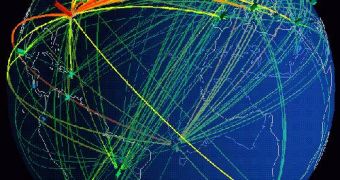The European Union's Intellectual Property Rights Enforcement Directive (IPRED) has been the main basis of Sweden's new Local IPRED Law, which states that ISPs can be forced to give copyright holders the personal data of their clients. On April 2nd, when the measure officially came into effect, monitoring sites said that traffic in and out of the country plummeted, from 120 GBps to less than 80 GBps. Statistically speaking, this is a 33 percent decrease, a drastic one for a country of little more than 9 million inhabitants.
It is estimated that approximately 8 percent of the entire population uses peer-to-peer (P2P) sites in the country, so it would stand to reason that the drastic decrease recorded in traffic yesterday was caused by people afraid of their personal data reaching the hands of copyright holders, who could then prosecute them in courts.
“Today, there is a very drastic reduction in Internet traffic. But experience from other countries suggests that while file-sharing drops on the day a law is passed, it starts climbing again. One of the reasons is that it takes people a few weeks to figure out how to change their security settings so that they can share files anonymously,” the Vice-Chairman of the Swedish Pirate Party, Christian Engstrom, told the BBC.
“We estimate there are two million file-sharing [computers] in Sweden, so even if they prosecuted 1,000 people to make an example of them, for an individual user it is still a very small risk,” he said, adding that while the risks of getting caught had somewhat increased, there was still not too much to worry about for those involved in P2P sharing.
“Before 1 April, the only thing we could do about illegal file sharing was to refer it to the police, who were very reluctant to take it on. Now we can go get the courts to force ISPs to disclose the user information of an IP address. In two weeks time, we will know exactly who owns that IP. We can then do nothing, ask him to stop, or sue him for damages. We won't do this for small offenders, this is just for the big fish,” the Chair of the Swedish Publishers' Association, Kjell Bohlund, added for the BBC.
There are, however, other aspects of the law to consider, including the fact that citizens' privacy can no longer be breached just by the police, but also by private corporations. There is no telling of what they would do with the data they collected with the warrants they get from judges.
“Dealing with illegal file-sharing is a job for the police. It is their job to enforce the law. Now we have given private corporations the legal right to go after our civilians. That's not how Western democracies work. In a study, 80% of people thought we shouldn't go after file-sharers. But ask them how they feel about taking money out of the pockets of musicians, authors or artists and that number falls by a significant amount. Ultimately we have to change people's perception on file-sharing,” Engstrom concluded.

 14 DAY TRIAL //
14 DAY TRIAL //